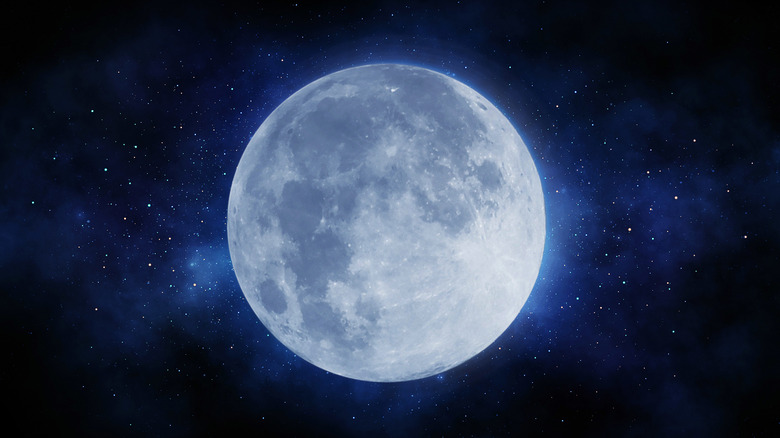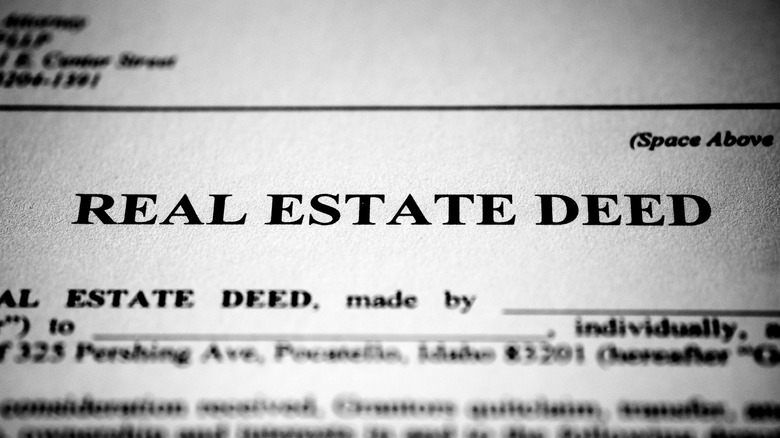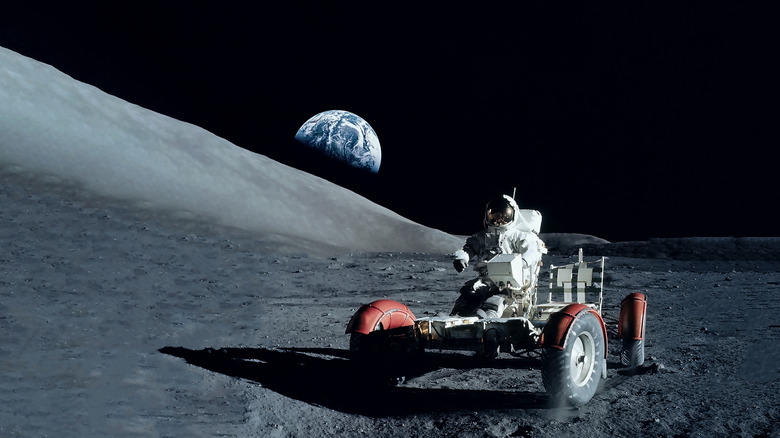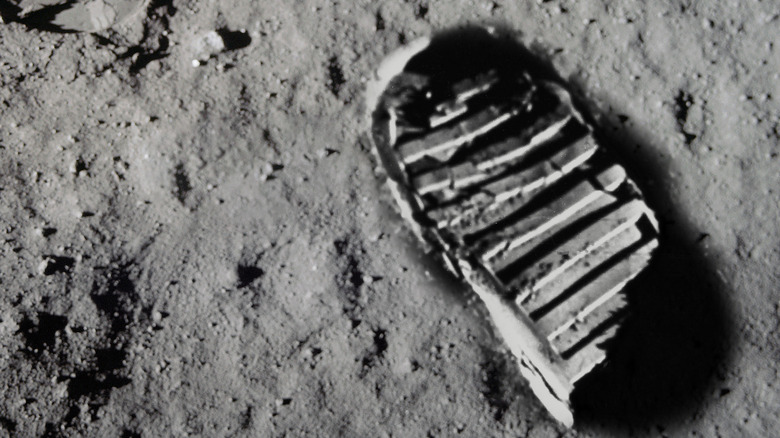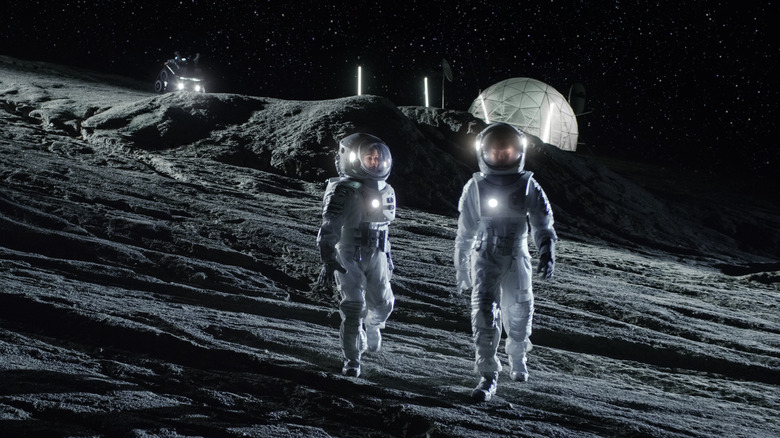Meet The Person Who Claims They Own Part Of The Moon
A routine part of living on Earth is being on land owned by someone. Whether it's owned by the government, a friend, your landlord, or yourself, there is no escaping land ownership, no matter where you step. However, when it comes to Outer Space, things work a little differently. When asking the question, "who owns the Moon and planets?" it's important to keep in mind the treaties and laws that have been put in place to prevent government ownership of places beyond Earth. These laws prevent government officials from claiming land on the Moon for their country (via the United Nations Office for Outer Space Affairs), but what about private ownership?
It turns out that there have been multiple claims on the Moon's surface by private individuals. While most have been illegitimate, there is one man, video game designer and astronaut Richard Garriott, who has an interesting connection to the Moon that may make him the only individual that has a claim on the Moon's real estate.
The Outer Space Treaty does not allow governments to own the Moon
The reason why you will never see governments claiming ownership of a part of the Moon or any planet is because of the Outer Space Treaty created by the United Nations. This treaty was adopted in October of 1967, before the first Moon landing on July 16th, 1969. Both the United States and Russia agreed on the treaty during the height of the Space Race, because they both believed that the other might try to claim the lunar surface for themselves if they got there first (via Phys.org). The Outer Space Treaty prevents nations from owning any part of Outer Space, and makes them liable for any damages caused by their space objects.
While the Outer Space Treaty does not specifically say anything about private ownership of the Moon, it still does not allow for individuals to own any part of the Moon. Despite this, there have been several famous figures who have claimed to have purchased lunar plots, including George Lucas, Barbara Walters, and Ronald Regan (via Discover Magazine).
Dennis Hope claims to own the entire Moon, but this is not legal
Celebrities who have purchased plots on the Moon have done so from a man named Dennis Hope, who claims that he owns the entire surface of the Moon. Not only does Hope say that he has ownership of the Moon, but also of the seven other planets and Pluto as well. On his website, Lunar Embassy, he claims to have purchased the surfaces of these celestial bodies in 1980 at his local US Governmental Office for claim registries and sent the United Nations a letter stating his intentions. The UN never responded to his letter, so he continues to perpetuate the idea that he has ownership over the Moon.
Dennis Hope has stated that his ownership of the Moon is due to a loophole in the Outer Space Treaty, since it does not specifically mention individual ownership; only government ownership is specifically prohibited. However, the treaty still prevents individuals from owning plots on the Moon. In order for any claim of "real property" to be recognized internationally, it must have derived from a national claim of sovereignty. If your ownership is recognized by a nation, it protects and legitimizes your ownership (via Forbes). But this subjects your ownership of that land to international and national laws, meaning that private ownership of outer space is prohibited under the Outer Space Treaty, making Hope's claim to the Moon illegitimate.
Richard Garriott bought a rover that is still on the Moon
While Dennis Hope's "ownership" of the Moon is not recognized, there is someone who has a special connection with the Moon that might allow him to own part of it. Richard Garriott is an entrepreneur, video game developer, and space tourist. Garriott is the son of astronaut Owen Garriott and has visited the International Space Station himself by paying his own way, making him the first second generation astronaut (via Britannica). The money he has made from designing online computer games has allowed him to purchase several objects that have been to space, including some that are still there.
In 1993, Garriot spent $68,500 at an auction on the Soviet Union's Lunokhod 2 lunar rover and its lunar lander, Luna 21. This made Richard Garriott the first and only private individual to own something on a celestial body (via Space.com). He also owns several other Russian space artifacts that he keeps in his home, including one of the original Sputnik spacecrafts (via Collect Space). Garriott's ownership of the Lunokhod 2 and the Luna 21 lunar lander puts him in a unique spot as the sole private owner of anything on the Moon.
Garriott says his claim to the Moon is mostly tongue in cheek
During a meeting for the Explorers Club, of which he is the President, Garriott claimed to own part of the Moon. He stated, "only slightly tongue in cheek, I will say that I own the Moon... I won't lay claim to the whole moon." His claim is that because he owns the Lunokhod 2 rover and the Luna 21 lander, he can own the lunar surface beneath them (via Space.com).
Garriott has also made arguments that he could technically own the tracks on the surface of the Moon where his rover travelled during its mission. Because the Moon has no atmosphere, it does not have weather events such as rain and wind to wash away the tracks, meaning that there is still evidence of Lunokhod's surveying journey (via PBS Learning Media). Garriott has made the point that because these tracks were caused by the rover he owns, he can own the tracks on the surface as well.
Ownership on the Moon may become more complicated in the future
While the Outer Space Treaty currently prevents any nation from owning the surface of the Moon and planets, this may become more complicated in the future. Currently, Russia and China are working together to build a lunar research station (via EarthSky), and NASA plans to set up it's own base as part of its Artemis 1 program. While these countries may not lay claim to an open plot of the Moon's surface, claiming ownership of the Moon bases would also technically require ownership of the surface beneath them.
Ownership of Moon bases is a bit of a legal gray area right now, but future legislation could regulate these issues in a similar fashion to how the Outer Space Treaty came to be in the first place. When it comes to the idea of property ownership on the Moon, only time will tell.
